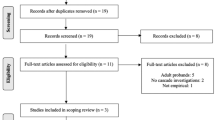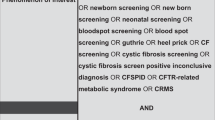Abstract
Even as debate continues about the putative obligation to proactively report genetic research results to study participants, there is an increasing need to attend to the obligations that might cascade from any initial report. We conducted an international, quasi-experimental survey of researchers involved in autism spectrum disorders (ASD) and cystic fibrosis (CF) genetics to explore perceived obligations to ensure updated information or relevant clinical care subsequent to any initial communication of research results, and factors influencing these attitudes. 5-point Likert scales of dis/agreement were analyzed using descriptive and multivariate statistics. Of the 343 respondents (44% response rate), large majorities agreed that in general and in a variety of hypothetical research contexts, research teams that report results should ensure that participants gain subsequent access to updated information (74–83%) and implicated clinical services (79–87%). At the same time, researchers perceived barriers restricting access to relevant clinical care, though this was significantly more pronounced (P<0.001) for ASD (64%) than CF (34%). In the multivariate model, endorsement of cascading obligations was positively associated with researcher characteristics (eg, clinical role/training) and attitudes (eg, perceived initial reporting obligation), and negatively associated with the initial report of less scientifically robust hypothetical results, but unaffected by perceived or hypothetical barriers to care. These results suggest that researchers strongly endorse information and care-based obligations that cascade from the initial report of research results to study participants. In addition, they raise challenging questions about how any cascading obligations are to be met, especially where access challenges are already prevalent.
Similar content being viewed by others
Log in or create a free account to read this content
Gain free access to this article, as well as selected content from this journal and more on nature.com
or
References
Fernandez C, Kodish E, Weijer C : Informing study participants of research results: an ethical imperative. IRB 2003; 25: 12–19.
Shalowitz D, Miller F : Disclosing individual results of clinical research: implications of respect for participants. JAMA 2005; 294: 737–740.
Miller FA, Christensen R, Giacomini M, Robert J : Duty to disclose what? Querying the putative obligation to return research results to participants. JME 2008; 34: 210–213.
Meltzer L : Undesirable implications of disclosing individual genetic results to research participants. Am J Bioeth 2006; 6: 28–30.
Ossorio P : Letting the gene out of the bottle: a comment on returning individual research results to participants. Am J Bioeth 2006; 6: 24–25.
Miller FA, Hayeems RZ, Bytautas JP : What is a meaningful result? Disclosing the results of genomic research in autism to research participants. Eur J Hum Genet 2010; 18: 867–871.
Ioannidis J : Expectations, validity, and reality in omics. J Clin Epidemiol 2010; 63: 945–949.
Siontis K, Patsopoulos N, Ioannidis J : Replication of past candidate loci for common diseases and phenotypes in 100 genome-wide association studies. Eur J Hum Genet 2010; 18: 832–837.
Ioannidis J : Non-replication and inconsistency in the genome-wide association setting. Hum Hered 2007; 64: 203–213.
Hirschorn J, Lohmueller K, Byrne E, Hirschhorn K : A comprehensive review of genetic association studies. Genet Med 2002; 4: 45–61.
Renegar G, Webster C, Stuerzebecher S et al: Returning genetic research results to individuals: points to consider. Bioethics 2006; 20: 24–36.
Wade C, Kalfoglou A : When do genetic researchers have a duty to recontact study participants? Am J Bioeth 2006; 6: 26–27.
Fernandez C, C S, Weijer C : Considerations and costs of disclosing study findings to research participants. CMAJ 2004; 170: 1417–1419.
Bookman E, Langehorne A, Eckfeldt J et al: Reporting genetic results in research studies: summary and recommendations of an NHLBI Working Group. Am J Med Genet 2006; 140A: 1033–1040.
Pullman D, Hodgkinson K : Genetic knowledge and moral responsibility: ambiguity at the interface of genetic research and clinical practice. Clin Genet 2006; 69: 199–203.
Miller FA, Hayeems RZ, Li L, Bytautas JP : What does ‘respect for persons’ require? Attitudes and reported practices of genetics researchers in informing research participants about research. JME 2012; 38: 48–52.
Kim S-J, Silva R, Flores C et al: A quantitative association study of SLC25A12 and restricted repetitive behavior traits in autism spectrum disorders. Mol Autism 2011; 2: 8.
Chiri G, Warfield M : Unmet need and problems accessing core health care services for children with autism spectrum disorder. Matern Child Health J 2012; e-pub ahead of print 3 February 2012.
Szatmari P, Paterson A, Zwaigenbaum L, Roberts W, Briaj J, Liu X-Q : Mapping autism risk loci using genetic linkage and chromosomal arrangements. Nat Rev Genet 2007; 39: 319–328.
Weiss L, Shen Y, Korn J, Arking D, Miller D, Fossdal R : Association between microdeletion and microduplication at 16p11.2 and autism. NEJM 2008; 2008: 667–675.
Kerem B, Rommens J, Buchanan J et al: Identification of the cystic fibrosis gene: genetic analysis. Science 1989; 245: 1973–1980.
Park J, Yung R, Stefanowicz D et al: Cystic fibrosis modifier genes related to Pseudomonas aeruginosa infection. Genes Immun 2011; 12: 370–377.
Hayeems RZ, Miller FA, Li L, Bytautas JP : Not so simple: A quasi-experimental study of how researchers adjudicate genetic research results. Eur J Hum Genet 2011; 19: 740–747.
Dillman D, Smyth J, Christian L : Internet, Mail, and Mixed-Mode Surveys: The Tailored Design Method, 3rd ed. Hoboken, New Jersey: John Wiley & Sons, Inc, 2009.
Schwappach D, Koeck C : What makes an error unacceptable? A factorial survey on the disclosure of medical errors. Int J Quality Health Care 2004; 16: 317–326.
Applegate B, Turner M, Sanborn JJ, Latessa E, Moon M : Individualization, criminalization, or problem resolution: a factorial survey of juvenile court judges’ decisions to incarcerate youthful felony offenders. Justice Quarterly 2000; 17: 309.
O’Toole R, Webster S, O’Toole A, Lucal B : Teachers’ recognition and reporting of child abuse: a factorial survey. Child Abuse and Neglect 1999; 23: 1083–1101.
Goldman H, Rachuba L, Van Tosh L : Methods of assessing mental health consumers′ preferences for housing and support services. Psychiatr Serv 1995; 46: 169–172.
Miller FA, Giacomini M, Ahern C, Robert J, de Laat S : When research seems like clinical care: a qualitative study of the communication of individual cancer genetic research results. BMC Medical Ethics 2008; 9: 4.
Hojsgaard S, Halekoh U, Yan J : The R package geepack for generalized estimating equations. J Stat Softw 2006; 15: 1–11.
Acknowledgements
We thank our study participants for taking the time to complete our survey as well as Genome Canada for funding this project. We also thank our clinical collaborators in the context of cystic fibrosis genetic research (Drs Peter Durie, Julian Zielenski, and Mary Corey) and autism spectrum disorders genetic research (Drs Stephen Scherer, Peter Szatmari, Wendy Roberts, and Lonnie Zwaigenbaum). Fiona A Miller is supported by a New Investigator Award from the Canadian Institutes of Health Research (80495). Robin Z Hayeems has been supported by a CADRE Postdoctoral Fellowship from the Canadian Institutes of Health Research and the Canadian Health Services Research Foundation, and is now supported by a CF Canada Research Fellowship. Sponsors’ support for this work should not imply endorsement of the conclusions, for which the authors retain sole responsibility.
Author information
Authors and Affiliations
Corresponding author
Ethics declarations
Competing interests
The authors declare no conflict of interest.
Additional information
Supplementary Information accompanies the paper on European Journal of Human Genetics website
Supplementary information
Rights and permissions
About this article
Cite this article
Miller, F., Hayeems, R., Li, L. et al. One thing leads to another: the cascade of obligations when researchers report genetic research results to study participants. Eur J Hum Genet 20, 837–843 (2012). https://doi.org/10.1038/ejhg.2012.24
Received:
Revised:
Accepted:
Published:
Issue date:
DOI: https://doi.org/10.1038/ejhg.2012.24
Keywords
This article is cited by
-
Incidental Findings from Clinical Genome‐Wide Sequencing: A Review
Journal of Genetic Counseling (2014)
-
Crossing the boundary between research and health care: P3G policy statement on return of results from population studies
European Journal of Human Genetics (2013)
-
Does a Duty of Disclosure Foster Special Treatment of Genetic Research Participants?
Journal of Genetic Counseling (2013)



